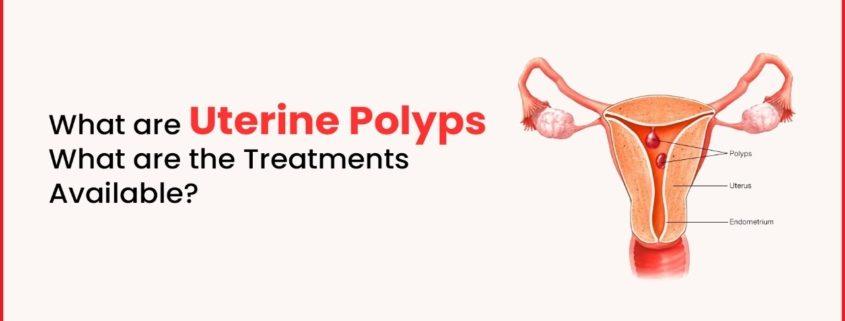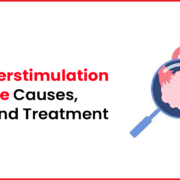What are Uterine Polyps? What are the Treatments Available?
What are Uterine Polyps?
Uterine polyps are small tumours that form on the lining of the uterus, the place where a fertilized egg implants during pregnancy. Although they are usually harmless, they can cause discomfort and sometimes affect fertility. Uterine polyps occur when endometrial tissue grows excessively. Polyps are attached to the endometrium by thin stalks or broad bases that extend into the uterus.
Polyps are round or oval and range in size from a few millimetres (the size of a sesame seed) to several centimetres (the size of a golf ball) or more. You may have one or more polyps. Uterine polyps are usually not cancerous, but they can cause problems with menstruation, periods, or childbirth. This article explains everything you need to know about uterine polyps, including causes, symptoms, and treatment options. This is especially useful for women who are concerned about their reproductive health.
What Causes Uterine Polyps?
Doctors are not exactly sure what causes uterine polyps, but a few things may play an essential role. One is hormonal imbalance, especially excess estrogen. Normally, estrogen helps the endometrium grow each month. Progesterone, another hormone, balances things out by preventing excessive growth of the lining. If there is not enough estrogen or progesterone, the lining can overgrow and form polyps.
Uterine polyps are sometimes asymptomatic, meaning they don’t cause symptoms. For this reason, many people with uterine polyps may never receive a diagnosis. Research does suggest that polyps are more common in certain populations. For instance, they’re more common in people who’ve gone through menopause than those who haven’t.
Certain diseases, such as polycystic ovary syndrome (PCOS), can also increase the risk of polyps. Other factors include ageing, being overweight, and using certain medications, such as tamoxifen, which is used to treat breast cancer.
What are the Symptoms of Uterine Polyps?
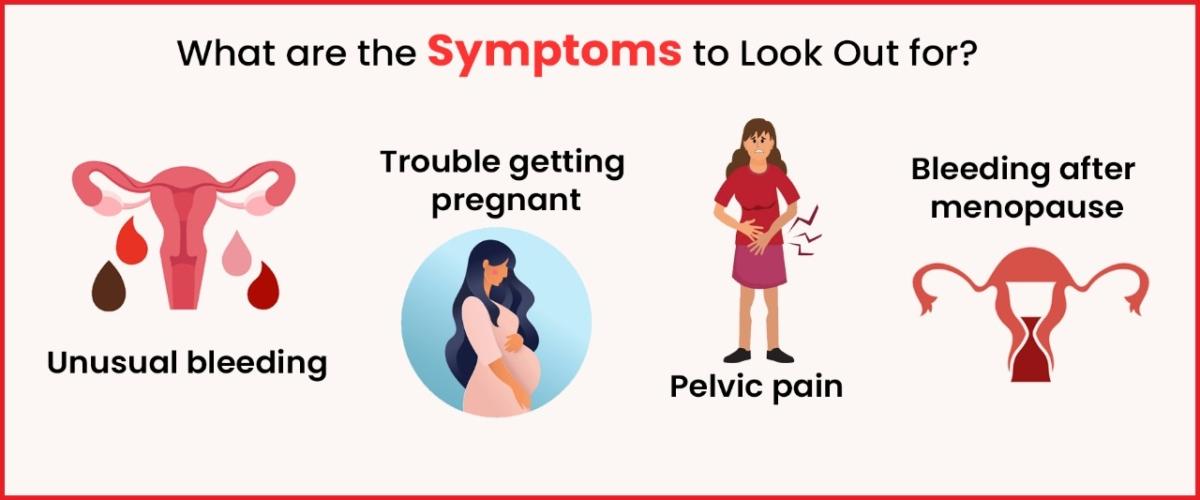
Uterine polyps don’t always cause problems, but some women experience symptoms that need attention. If you have any of these, it’s important to see a doctor to get a proper diagnosis.
Abnormal bleeding may be a sign of uterine polyps — especially if you’re postmenopausal. It can be alarming to have unusual bleeding, but most causes of bleeding like polyps are unrelated to uterine cancer. Early detection and treatment can help avoid complications, especially if you’re trying to get pregnant.
Let’s understand all the symptoms in detail:
1. Unusual bleeding
This is the most common symptom. You might have periods that last longer than usual and are heavier or bleeding between periods. Most periods last four to seven days. Normal menstrual cycles usually occur every 28 days but can range from 21 days to 35 days. Many people with uterine polyps have irregular periods.
2. Trouble getting pregnant
Polyps can make it harder for a fertilized egg to implant in the uterus lining.
3. Pelvic pain
Some women experience pain or discomfort in their lower abdomen, especially during their period or sex. This can be concerning and may lead to anxiety and uncertainty about the underlying cause.
4. Bleeding after menopause
If you’ve gone through menopause or stopped having periods and experienced any bleeding, it’s important to see a doctor right away.
How are Uterine Polyps Diagnosed?
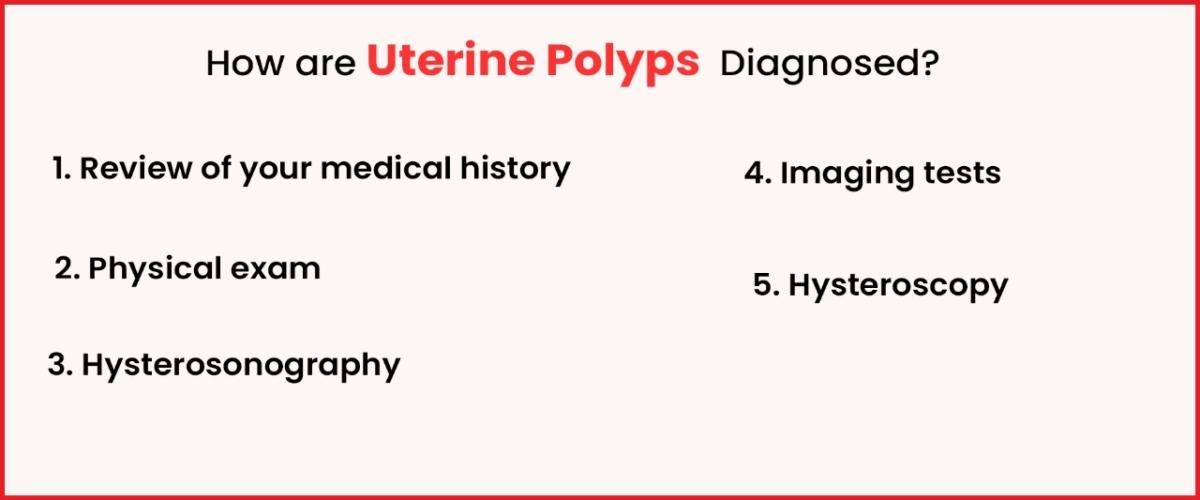
Your fertility centre will review your medical history and ask about your symptoms. They may ask if you’ve ever had trouble getting pregnant. They might also run some pregnancy tests, including a pelvic exam. Additional tests and procedures may be needed to determine if the tumour is a polyp.
Doctors usually use several different methods to diagnose uterine polyps, including:
- Review of your medical history: They will ask about your symptoms, illnesses, and medications you are taking.
- Physical exam: This may include the pelvic area. where your doctor checks your uterus for possible abnormalities
- Hysterosonography: During Hysterosonography, a care provider uses a thin, flexible tube (catheter) to inject salt water (saline) into the hollow part of the uterus. An ultrasound probe gets images of the inside of the uterus to check for anything unusual.
- Imaging tests: A transvaginal ultrasound uses sound waves to create a picture of your uterus and ovaries.
- Hysteroscopy: It is a procedure in which a thin, lighted tube is inserted into the uterus to see the lining directly.
Treatment of Uterine Polyps Options Available
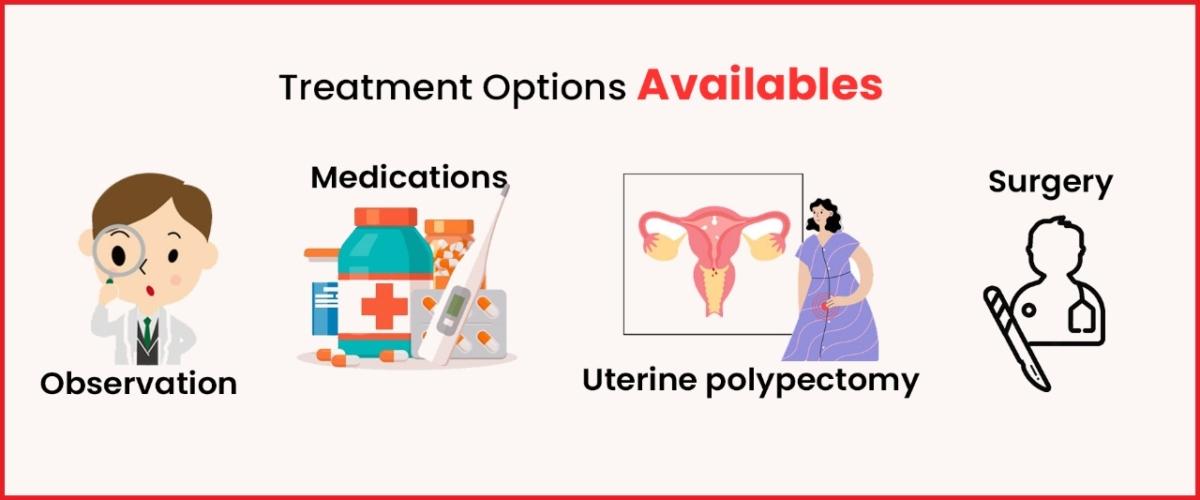
The best home treatment for polyps depends on several factors, including their size, location, and whether they have symptoms. Your desire to have children is also important, so choosing an experienced fertility expert is crucial.
Here are some treatment options that can be beneficial-
1. Observation
For small, asymptomatic polyps, doctors may recommend waiting and watching them, especially in women who are menopausal or have no major problems.
2. Medications
Hormonal medications, such as progestins, can help shrink them. or prevent polyps from growing, often the preferred approach before surgery.
3. Uterine polypectomy
Your provider will likely be able to remove the polyp during a hysteroscopy. A hysteroscope allows your provider to insert tools that can be used to cut and remove polyps. The advantage of the hysteroscope is its accuracy. Your provider can see the polyp and remove it at the same time. They may then send the tissue to a lab to check for signs of cancer.
If the polyp is cancerous, you may need additional surgery. A hysterectomy, or surgery that involves removing the uterus, may be necessary in cases where the polyps contain cancer cells.
4. Surgery
If polyps are large or cause symptoms, surgery may be necessary. Procedures such as dilation and curettage (D and C) can remove polyps while preserving fertility. Choosing a qualified surgeon and a reputable fertility centre is crucial for such procedures.
Imprimis IVF Fertility Centre: Your Partner in Overcoming Challenges
Uterine polyps can affect fertility, but with early detection and proper treatment, you can overcome these obstacles and achieve. Healthy Pregnancy If you are experiencing infertility or symptoms of uterine polyps, Imprimis IVF Fertility Centre can provide care and effective solutions tailored to your unique situation.
We understand the emotional challenges of infertility and are committed to providing compassionate care and personalized treatment plans. helps you achieve your dream of parenthood.
Our experienced fertility specialists can diagnose and treat a wide range of reproductive health problems, including uterine polyps. With advanced diagnostic tools and multiple treatment options, we can create a plan that meets your specific needs and increases your chances of success.
Whether you are experiencing infertility, recurrent miscarriages, or other reproductive health issues, we are here to support you. every step of the way. You don’t have to walk this journey alone. Let Imprimis IVF fertility centre help you realize your dream of starting a family. Contact us today to schedule a consultation and take the first step toward a brighter future.

